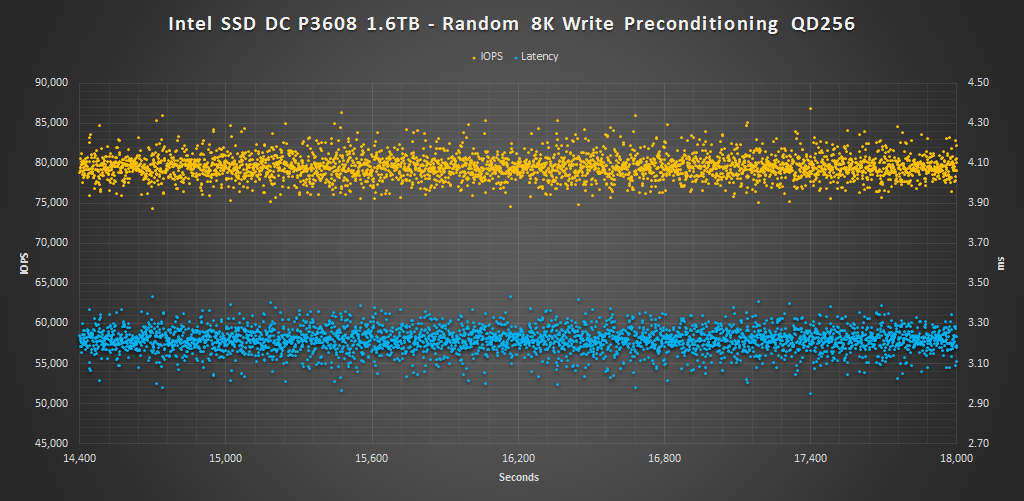8KB RANDOM READ/WRITE
To measure 8KB random read/write performance do the same preconditioning as we did for 4KB performance. The drive is first secure erased to get it in a clean state. Next, the drive is filled by sequentially writing to the RAW NAND capacity twice. We then precondition the drive with 8KB random writes at QD256 until the drive is in a steady state. Finally, we cycle through QD1-256 for 5 minutes each for writes and then reads. All this is scripted to run with no breaks in between. The last hour of preconditioning, the average IOPS, and average latency for each QD is graphed below.
 8KB preconditioning RAID 0 follows a similar trend to that of our 4KB precondition results. IOPS range about 10K from least to most and average around 79K. Latency during 8KB write at QD256 ranges about 0.40ms and averages at around 3.20ms.
8KB preconditioning RAID 0 follows a similar trend to that of our 4KB precondition results. IOPS range about 10K from least to most and average around 79K. Latency during 8KB write at QD256 ranges about 0.40ms and averages at around 3.20ms.
At a QD of 16 8KB reads reach 100K IOPS for both configurations and from there on RAID 0 increase about 100K per double of QD and the single volume maxes out more quickly at QD 128 at around 250K IOPS. At QD256 we see that the DC P3608 reaches just below 500K IOPS.
The Intel CD P3608’s 8KB read latency performance is similar to its 4KB performance, only about double.
In terms of write performance it is able to reach a max of just under 80K IOPS in RAID 0 and 40K for the single volume.
Looking at the latency per QD we can see that at QD 64 latency is under 1ms and it is able to provide for nearly peak performance in RAID 0. After that, at QD 128 and 256, latency doubles while IOPS remain relatively the same.
 The SSD Review The Worlds Dedicated SSD Education and Review Resource |
The SSD Review The Worlds Dedicated SSD Education and Review Resource | 

Random adjectives, desperate efforts to “humanize” the tech resulted in this huge review to contain next to no information at all.
There is no easy way to say this: software RAID 0 on PCIe is simply retarded.
Thanks for your thoughts
Now just make it affordable
Well, for enterprise it is very affordable for what you get. If you are concerned about consumers/enthusiasts I can see where you are coming from, but this is not meant for them. Next year, however, we may be seeing performance like this trickle down.
More than likely next year
As an enterprise product I can see it as a high-end workstation device but not a server device. The lack of RAIDability seems to limit its use to caching and high-speed scratch work area.
I’ve been informed that PCIe hardware RAID will be available on the Skylake CPU and the Xeon version when it comes out later. Now we’re talking………
so this is a preview, not a review… where are the comparisons to P3700 and PM951?
I don’t have access to those drives. We reviewed the P3700 in another system. Because of that as well as a change in our testing methodology, we cant not graph them side by side. Looking at the P3700’s specific review you can gauge for yourself the approximate performance difference between the two.